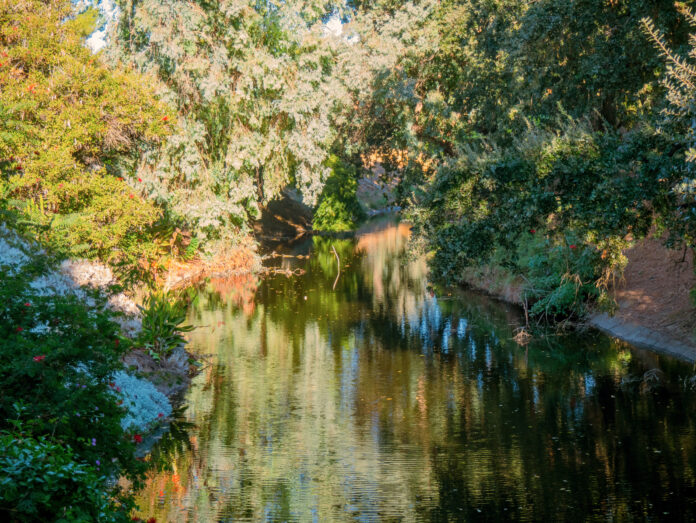Advice from a Putah Creek Reserve specialist
By FAITH DEMEULENAERE — features@theaggie.org
The sky is clear, the bees are humming, the plants are beautiful and the sun is, well, hot.
On a warm day in Davis, visitors, students and locals alike flock to the Putah Creek public sector to take a dip in this beautiful, picturesque waterway. However, underneath the surface, Putah Creek is a habitat for multiple species, big and small. Could they pose any threats to swimmers? Or possibly more importantly, could we pose any threats to them?
Andrew Fulks, the assistant director of the UC Davis Arboretum and Public Garden, spoke on the art of swimming mindfully at Putah Creek. Fulks’ insights are not only valuable to those seeking aquatic adventure, but they also serve as a reminder of the importance of coexisting harmoniously with the natural wonders that grace our campus here at UC Davis.
“The live stream is no less safe than any natural water body in the area,” Fulks said. “The water comes from Lake Berryessa, flows past the town of Winters and through the agricultural fields out to the Delta. People need to know how to swim and wear water shoes to avoid any underwater hazards such as sticks.”
Fulks also addressed the circulating rumors that Putah Creek is unsafe due to leeches and other aquatic organisms.
“There are some [segmented parasitics, leeches or something similar] that have fish as the primary host, but they are harmless to humans,” Fulks said.
It’s no secret that Putah Creek is brimming with aquatic life. Beavers, river otters and a wide variety of fish species including bass, sunfish and trout are just some of the organisms that survive and thrive in the Putah Creek, according to Fulks.
However, he reminds visitors that when swimming amongst these animals, one must be mindful of how their actions impact the wildlife in the area.
“Don’t harass any wildlife you see,” Fulks said. “Don’t dump trash or fluids in the creek and pick up any trash you see when visiting so that it doesn’t go into the water.”
As for fishing, the Rules and Regulations section for Putah Creek found on the Arboretum website directly states, “Collection of plant and wildlife specimens is prohibited, without prior written authorization and appropriate State or Federal permits.”
Fulks eased concerns about harmful bacteria that some fear when swimming in lakes or creeks by sharing information on the conditions of Putah Creek’s water.
“There can be cyanobacteria blooms in the Arboretum Waterway, but we haven’t had these in Putah Creek proper,” Fulks said. “Those tend to form in waters that aren’t flowing, and Putah Creek has a healthy flow.”
Fulks has a long history with Putah Creek, being hired by the University in 2002 to manage the Putah Creek Riparian Reserve, according to a blog post on the history of Putah Creek found on the Arboretum website.
“He worked with the campus to establish a vision for the Reserve including creating a formalized network of trails, re-establishing native vegetation, removing invasive plants, restoring habitat and more,” the website states.
However, before he could tackle any of that, he first had to work on securing the area.
“Back then, the Reserve was akin to the Wild West,” Fulks said. “Because it wasn’t actively being managed, the Reserve had become a popular dump, illegal camping area and destination for off-road recreational vehicles.”
Thanks to the hard work and dedication of Fulks, the creek has been increasingly flourishing, making Putah Creek the beautiful waterway the city of Davis knows it to be.
“I’ve been going to Putah Creek since I was a second year,” Julia Cole, a fifth-year environmental science major, said. “There were always jokes about the ‘brain-eating amoeba.’ I have always thought it was dumb, the creek is well taken care of and the community obviously really cares about its cleanliness and dignity.”
“Treat the creek respectfully,” Fulks said. “Think about how to leave it better than you found it for future visitors.”
Written By: Faith DeMeulenaere — features@theaggie.org




